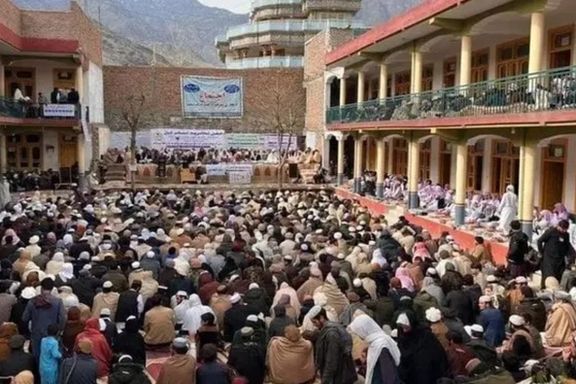Taliban Leader Orders Termination of Foreign Funding for Ahl-e-Hadith Seminaries in Kunar

Mullah Hibatullah Akhundzada, the leader of the Taliban, has issued a directive instructing the group’s intelligence agency to identify and halt foreign funding sources for “Ahl-e-Hadith” seminaries in Afghanistan’s Kunar province.
Additionally, the Taliban leader has called for the exclusion of “Ahl-e-Hadith” affiliates from government employment, advocating for their dismissal from official roles.
A copy of this directive, obtained by Afghanistan International, reveals that Akhundzada has tasked Taliban intelligence operatives with preventing foreign financial support for Ahl-e-Hadith educational institutions. The order further stresses the need to curb the influence of “non-followers” within government departments.
This directive, issued 20 days ago, followed a report submitted to the Taliban leader by the group’s intelligence service concerning the situation in Kunar.
In the directive, Akhundzada instructs the Taliban’s military courts to investigate and adjudicate claims of murder within their jurisdiction. Furthermore, the order requests the Ministry of Guidance, Hajj, and Endowments to appoint “followers” in institutions associated with Kunar province, replacing Ahl-e-Hadith personnel.
The directive also urges that the General Directorate of Intelligence appoint a “strong and follower” candidate as the head of intelligence in Kunar. Additionally, the Ministry of Education has been asked to establish officially sanctioned seminaries in Kunar, conduct inquiries into non-follower seminaries and their funding sources, and obstruct any foreign financial backing for these organisations.
In a related instruction, the Ministry of Interior has been tasked with reviewing and finalising its organisational structure in Kunar. The directive underscores that Ahl-e-Hadith members should be excluded from Ministry of Interior roles and, if identified, should be removed from their positions.
Local Taliban sources in Kunar informed Afghanistan International that the terms “follower” and “non-follower” are widely used in the region. The Taliban accuse “Ahl-e-Hadith” and Salafi groups of affiliations with ISIS.
According to local sources, these groups have criticised the Taliban for perceived lapses in fully enforcing the Quran and Hadith, accusing the group of blind adherence. The sources further indicated that, in an effort to limit ISIS’s influence, the Taliban have imposed restrictions on the activities of Ahl-e-Hadith seminaries in Kunar.
Kunar remains one of Afghanistan’s provinces with significant Salafi influence. Observers have also accused the Taliban of assassinating prominent Salafi figures in Kabul and eastern Afghanistan in recent years.